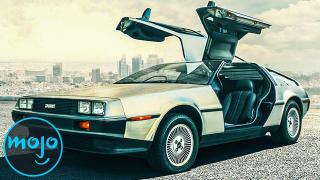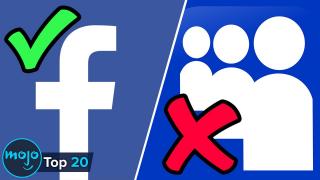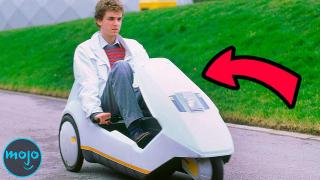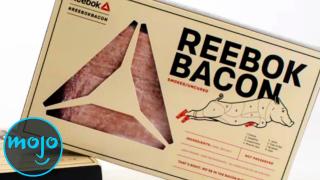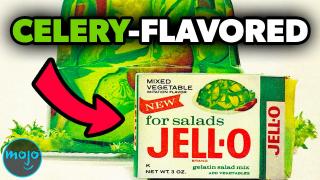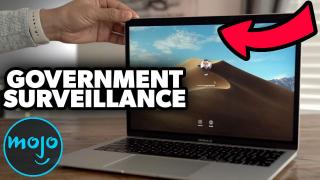Top 10 Products That Almost DESTROYED The Company
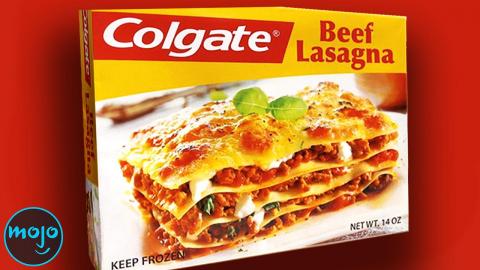
#10: HP TouchPad
Top 10 Products That Bombed so Hard They Destroyed the Company
Hewlett-Packard Apple gave the entire tech industry a roadmap for how to make a successful tablet computer. Unfortunately, Hewlett-Packard learned the hard way that their TouchPad was nowhere close to an iPad. Marred by middling reviews and poor advertising, initial sales were far below expectations. In fact, the HP TouchPad’s launch was so disastrous, it didn’t make it fifty days on shelves before the line was discontinued. In the chaos, Hewlett-Packard even tried to sell off their personal computer division as a whole. Luckily, the TouchPads became something of a novelty and saw a sharp surge in sales due to their limited quantity. But, not even that could save Hewlett-Packard’s stock from dropping around 40%.
#9: Toothpaste Entrees
Colgate Food and dental hygiene go hand and hand. Colgate attempted to capitalize on that in the 80s with their limited line of frozen dinners. It’s a good idea on paper: you eat a Colgate meal, and then clean up with some Colgate toothpaste afterward. The issue was that most people didn’t want to eat something that reminded them of brushing their teeth. Allegedly, the product’s sales bombed hard, causing Colgate to abandon their trek into the food industry. It’s probably for the best that they’ve stayed with toothpaste ever since. After all, nowadays, the Colgate Entrees are rightfully displayed in the aptly-named Museum of Failures.
#8: N-Gage
Top 20 Products That KILLED Competitors
Nokia One part smartphone, one part gaming console, and all parts disappointing, the N-Gage failed by just about every metric. It wasn’t slick enough to be a cellphone, but was too cumbersome for most gamers. As a result, the N-Gage couldn’t entice its target audience and spent most of its lifespan collecting dust on the shelf. Following its dismal debut in 2003, it’s no surprise that Nokia’s market share plummeted. Almost three years later, the N-Gage was officially pulled off the production line. And, lo and behold, the company’s footprint grew to an all-time high. No matter how you look at it, it’s clear that the N-Gage didn’t do Nokia any favors.
#7: Dreamcast
Sega Despite its name, this gaming console was more of a nightmare. Not because of its quality. On the contrary, the Dreamcast is still regarded as one of the best consoles ever made, sporting several iconic titles like the original “Sonic Adventure.” However, that acclaim didn’t translate to strong sales. It didn’t completely sink Sega, but boy did it come close. The Dreamcast’s financial failure played a major role in Sega laying off a third of their Tokyo workforce. In 2001, they powered off the Dreamcast for good, and later abandoned the console market altogether. Since then, Sega has strictly focused on making games instead of software.
#6: Premier Smokeless Cigarettes
Top 10 Worst January Signings from the Premier League
R.J. Reynolds Tobacco Company In the face of burgeoning anti-smoker sentiment, R.J. Reynolds tried to maintain their buyer base by introducing a healthier kind of cigarette. Enter Premiers. The smokeless variants had all the nicotine of a normal drag without several drawbacks. But, in doing so, they also lacked the flavor that most smokers wanted. In fact, the Premier’s tasted so bad, not even the proven health benefits could convince people to switch. The smokeless cigarettes were canceled after just a single year on the market, causing R.J. Reynolds to write off as much as one billion dollars in losses. It’s a wonder how their wallets ever recovered.
#5: HD DVD
Top 10 Tech Products That Bombed So Hard They Destroyed the Company
Toshiba The war over home-video software was fought with cash, not soldiers. At first, Toshiba’s high-definition DVD player seemed like a worthy competitor for the up-and-coming Blu-Ray. But, that was part of the issue. Audiences either couldn’t tell the difference or didn’t care enough to let it sway them. Since Blu-ray had the backing of film studios and most retailers, Toshiba was only left with disappointing sales figures. Eventually, the HD DVD player waved the white flag and went down in a sea of debt. Taking a look at Toshiba’s output, it looks like this failure was the beginning of the end for the tech giant.
#4: de Havilland Comet
Top 10 Products Companies Want You To Forget About
de Havilland There’s a special place in history for the world’s first commercial jet airliner. Especially since it also holds the title of the first fatal jetliner crash. The Comet’s innovations were immediately overshadowed by three separate accidents in its first year alone. Along with the lives of several passengers, the crashes also destroyed de Havilland’s reputation. At the very least, the controversy pushed the whole industry towards new safety standards. But, by then, the damage to the Comet was already done. Against safer and more economical choices, orders stopped coming in. de Havilland had to be bought and rebranded before they came close to backing back.
#3: “E.T. the Extra-Terrestrial” (1982)
Top 10 Food Products That Bombed Hard
Atari, Inc. Don’t let the name fool you; this game is basically unrecognizable from the beloved 80s film. Or, really, as a working piece of entertainment at all. “E.T. the Extra-Terrestrial” endured an unprecedented critical bashing, and that trickled down to developer Atari, too. In fact, it could be argued that the company’s reputation never truly recovered. Their wallets certainly didn’t. But, “E.T.’s” disastrous reception impacted more than just Atari. It’s also considered one of the compounding factors behind the fall of video games in the 80s. You know your game is bad when it doesn’t just threaten its own company, but the entire industry as a whole.
#2: Edsel
Ford Motor Company This product line may be a legendary failure, but it wasn’t for a lack of advertising. Ford booked ads, assured investors, and even called its launch event “E-Day.” They did just about everything in their power to make Edsel the next big thing. Well, everything except making a car that people wanted to buy. The economic recession of the 50s didn’t help early sales. Neither did the car’s shoddy workmanship and ugly design, for that matter. In the end, Ford got very little return on their investment. While the success of their other lines meant they could endure this misfire, that doesn’t make it any less embarrassing.
#1: The Apple Newton
Top 10 Dark Secrets Apple Doesn't Want You to Know
Apple Inc. They say one bad apple spoils the bunch. But, this company has a whole lot more than just one. For example, does anyone remember the “Apple Pippin?” We don’t blame you. The defunct entertainment system bankrupted licensor Katz Media, and nearly did the same to Apple, too. Although, the Apple Newton almost did them in long before that. The personal digital assistant was one of the first of its kind - and also one of the worst-selling. When Steve Jobs returned to the company in 1998, he personally discontinued the Pippin and the Newton. By cutting his losses, he was able to turn this sinking ship into the tech juggernaut it is today.


